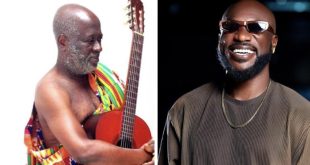
The Supreme Court has, by a majority decision, upheld the Food and Drug Administration’s (FDA) directive, which prevents celebrities from endorsing alcoholic drinks.
This brings an end to a highly publicised nineteen-month legal suit filed against the Authority by the CEO of Black Kulcha Music, Mark Darlington Osae.
Delivering an abridged version of the ruling at the apex court on Wednesday, June 19, Chief Justice, Gertrude Torkornoo, said the FDA’s directive does not contravene the constitution.
This means that well-known personalities or professionals are perpetually banned from appearing in advertisements that promote alcoholic drinks.
On the day this landmark ruling was given, only one well-known personality in the showbiz industry, George Quaye showed up in court.
The full ruling is expected to be made public on Friday, June 21.
Speaking to reporters after the ruling, the Director for Legal and Corporate Affairs at the Food and Drugs Authority, Joseph Bennie, welcomed the ruling and said the Authority will take steps to prevent well-known personalities and professionals from circumventing the order.
An angry representative of the plaintiff with the Ghana Music Alliance, Nii Ofoli Yartey, left the courthouse, saying they’d continue with their advocacy.
The Food and Drugs Authority (FDA) enforced a directive meant to regulate the use of alcohol among Ghanaians. However, aspects of their guidelines prevent celebrities from advertising alcoholic beverages.
The Authority had explained that due to the influential nature of these showbiz personalities, alcoholic advertisements they are involved in could push minors into alcoholism.
Representing the plaintiff Mark Darlington Osae, was Bobby Banson from the Robert Smith Law Group, while the Food and Drugs Authority was represented by Justine Amenuvor.
On November 11, 2022, Mark Darlington Osae, the manager of Reggie ‘N’ Bollie and Skrewfaze, filed a writ at the Supreme Court, describing the FDA’s 2015 regulations against alcoholic advertisements by celebrities as discriminatory against the creative arts industry.
The writ indicates that the FDA directive, which orders that, “no well-known personality or professional shall be used in alcoholic beverage advertising,” is inconsistent with and in contravention of articles 17(1) and 17 (2) of the 1992 Constitution.
He contends that Articles 17(1) and 17 (2) of the 1992 Constitution guarantee equality before the law and prohibit discrimination against persons on grounds of social or economic status, and occupation, among others, and consequently make the directive null, void, and unenforceable.
According to the stakeholders in the culture and creative industries, endorsements or advertisements of alcoholic beverages are one of the very few income streams available to them at present, therefore, any law that restricts their engagement in such activities robs them of their livelihood.
 Uniquenewsgh.com News, Politics, African News Updates & More
Uniquenewsgh.com News, Politics, African News Updates & More



